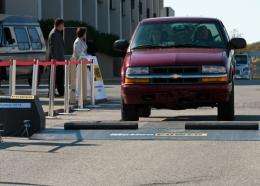November 9, 2011 report
Speed-bump device converts traffic energy to electricity

(PhysOrg.com) -- The two little words "speed bump" usually evoke unpleasant memories of spilled coffee and back-seat arguments questioning if and where you learned how to drive. In some green energy circles, speed bumps take on a far more pleasant image. You may even hear a more dignified and important term, such as “kinetic energy recovery device.”
A Maryland company, New Energy Technologies, has devised that kind of speed-bump device, which the company likens to a rumble strip, that harvests kinetic energy from vehicles and converts the energy into electricity.
New Energy’s MotionPower Express system captures the unused kinetic energy of vehicles at points where they are required to slow down or come to a stop.
New Energy has ambitions to see its MotionPower Express devices become a part of the toll booths, rest areas, parking lots, airport arrival and departure areas, city lighting systems, zones in other places where traffic should be slowing down—scenarios that can benefit from a greener approach to energy and electricity cost savings.
New Energy has been testing its technology for over a year. The company recently got a boost in publicity by partnering with the city of Roanoke in Virginia to put its MotionPower Express system to the test. According to the company and the city, that test, which was carried out late last month, was successful. Roanoke tested the device that generated energy when vehicles drove over it.
MotionPower Express is suited for installation where vehicles are traveling faster than 15 mph and are slowing-down before stopping, including parking lots, border crossings, exit ramps, neighborhoods with traffic calming zones, rest areas, toll booths, and travel plazas.
The installation at the Roanoke Civic Center was during a busy time when the center was hosting a gun show and circus. A total of 580 cars passed over the rumble strip in six hours.
Reports claim this traffic over this amount of time generated enough electricity to power an average U.S. home for a day. In a commercial context, the traffic over a six hour period was claimed to produce enough electricity for a 150 square-foot electronic billboard or marquee for a day.
New Energy Technologies has been field-testing MotionPower for over a year. In 2009, they conducted a field test at a Burger King in Hillside, New Jersey.
At the time of the Burger King test, the company estimated that each MotionPower speed bump would cost $1,500 to $2,000 and earn back its cost in two to three years. A business could use it to offset electricity costs, or sell back energy to the grid if applicable through state metering laws.
The City of Roanoke will be publishing results of the trial installation in January.
If all this sounds vaguely familiar, it is because numerous companies have been interested in deploying novel solutions that can harness energy.
In 2009, news from the UK was that a startup called Highway Energy Systems was installing “Kinetic Road Plates” at a Sainsbury's supermarket in Gloucester. The goal was to harness energy from vehicles driving in and out of the store's car park to power store checkouts.
Pavegen is a company that says that each time someone walks over its Pavegen tile, renewable energy is harvested from the footstep. Pavegen technology converts kinetic energy to electricity which can be stored and used for a variety of applications. Those applications include street lighting, displays, and signage.
More information: www.newenergytechnologiesinc.com/motion_power
© 2011 PhysOrg.com



















